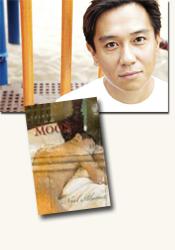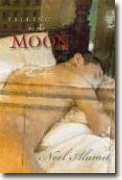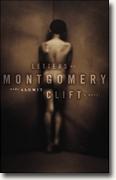author interview
book reviews:
· general fiction
· chick lit/romance
· sci-fi/fantasy
· graphic novels
· nonfiction
· audio books
· author interviews
· children's books @
curledupkids.com
· DVD reviews @
curledupdvd.com
newsletter
win books
buy online
links
home
for authors
& publishiss
for reviewers

|
|||||
 
Curledup.com contributor Michael Leonard interviewed Noel Alumit,
author of Talking to the Moon Interviewer Michael Leonard: What gave you the idea to use the real-life shooting of Filipino mailman Joseph Santos Ileto as a basis for Talking to the Moon Noel Alumit: Hate crimes affect me. It amazes me that they still occur. As a gay man, I know my community is one of the most targeted groups for crimes of hate. The shooting of Joseph Ileto affected me. It meant my sexuality and race makes me a double target. I was afraid that the Ileto incidentólike so many violent actsówould merely be footnoted. I thought it deserved more than that.
Could you tell about the process you went through in creating this fictional tale out of an actual event? The book I wanted to write would explore Love and Hate and how they are so intertwined, particularly in a family. I donít know any family where some member doesnít loathe another member. Regardless, those members are forever bonded, whether it be parent/child, nephew/aunt, cousin/cousin. Even before the Ileto incident, these thoughts were swirling in my mind. I could probably have written such a book without the Ileto incident, but it would have been a family drama. The hate crime layers my story with more political and social shades as well. I think that makes for a far more interesting read.
Frankly, it happened by accident. It originally was going to be seen through Emersonís eyes. The story didnít quite seem full. As an exercise to get more details and fullness to the story, I began writing in the voices of other people in the story. Voila! It worked so much better that way, I think.
I wanted to state that the immigrant narrative doesnít just begin in America. The decision to come to the United States, which means leaving behind all of your family, friends, language, and culture, is layered by countless decisions. All of their choices in the States were founded on what they experienced in the Philippines.
Both Jory and Belen bring the myths of their childhood and their respective faiths to America - especially Belen, who worries about the devastating "curse" that she thinks is put upon her family. How do you think religion comforts both Jory and Belen? Religion writer Karen Armstrong talks about a purpose of religion is to transcend. I think we all have the need to be better than what we are. Religion does that for Jory and Belen. It provides direction.
Thereís an interesting conflict between Belen's Catholicism vs. Jory's respect for the natural world, especially for the power of the Moon. What significance do you think the Moon holds for Jory, and likewise, the Virgin Mother for Belen? The Moon, The Virgin, and Emersonís Dead Brother is the only constant in their lives, their only companion. They can tell secrets to their own respective deities and no one will have to know; yet it provides a kind of psychological release for these characters. I think thatís a major purpose of religion. I think one of the reasons why churches or synagogues or temples in America are having a hard time maintaining membership is because therapy is so available. If therapy wasnít around, I think the pews would be packed. Although Talking to the Moon Many years ago, my mother told me that she was attracted to a seminarian and he was attracted to her. She had to pull away because she was told that taking a man away from God was certainly bad luck. I always thought that was interesting and wove it into this story.
The novel is also about the importance of family and how they cope in crisis. Belen and Emerson have been estranged of late over the issue of Emerson's homosexuality. How do you think Jory's shooting brings the Lalabans, particularly Belen and Emerson, closer together? A common threat will always bring people together. If Martians wanted to attack Earth and her inhabitants, Iím sure countries would put aside their petty differences, unite, and fight the common foe.
In fact, Emerson seems to be a bit lost and detached from those close to him. Why do you think Emerson imagines talking to his dead brother, and what do you think is the significance of this? Emerson, like most people, really wants to be intimate with someone. Due to his life experience, he canít be that close with living beings, so he behaves intimately with a dead one. Jun, his dead brother, serves as his own personal God.
I think she takes pride in her own personal experiences. It takes a strong woman to endure what she has endured. I think she knows this. Sheís stronger than most people give her credit for. Michael is an interesting character, with his predilection towards obtaining perfection. What do you think drives him? And why did you decide to include him as the other voice in the narrative? I think itís hard being a pearl in a jewelry box filled with plastic baubles. He seeks out others like him. This seems to be the case for many minorities: looking for like-minded people.
You weave many themes throughout the novel Ė the immigrant experience, hate crimes, the fragility of human sexuality, and the inevitable cycles of life and death. What themes do you think will resonate most with readers? I think the cycles of life and death will be the most apparent. It seems that the feedback Iíve gotten on the book thus far have been from people conscious of the fact that their children are growing or from people who know the difficult experience of seeing their parents get older with the knowledge that mom and dad will eventually leave. To many, Los Angeles is seen as the immigrant city, the great melting pot of cultures. Your previous novel, Letters to Montgomery Clift, was also set in L.A. What especially appeals to you about using L.A. as a backdrop for your stories? Los Angeles is the city that I grew up in. It is the most familiar place to me, more familiar than the Philippines. My development as a man, an artist took place in LA. Iíve been labeled many things: a gay writer, an Asian American Writer, a diasporic writer, a postmodern writer. The one thing I will claim above all else is that Iím a Los Angeles writer. Talking to the Moon I put a lot of pressure on myself. Letters to Montgomery Clift got a lot of acclaim. It was nominated for some really great awards. It even won a few. When I started Talking to the Moon Are you working on a new project, and if you are, would you like to tell us a little bit about it? I am working on a new novel. All I can say is there is blood involved. And finally, what would you like readers to ultimately take away from Talking to the Moon Love and hate are intertwined. We have to experience one to know the other. Playwright and actor Noel Alumit's work has been published in Tilting the Continent (New Rivers Press), Take Out (Asian American Writers Workshop/Temple University), Subterraneans, and the literary journal DisOrient. His heralded debut novel, Letters to Montgomery Clift (MacAdam Cage), received the 2003 Stonewall Book Award for literature and his second novel, Talking To the Moon, was released in late 2006. Contributing reviewer Michael Leonard interviewed Noel Alumit, author of Talking to the Moon (see accompanying review), about his book for curledup.com. Michael Leonard/2007.
|
|||||
| fiction · sf/f · comic books · nonfiction · audio newsletter · free book contest · buy books online review index · links · · authors & publishiss reviewers |
|
| site by ELBO Computing Resources, Inc. | |


